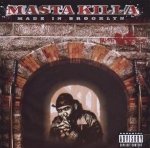Masta Killa, Made in Brooklyn
reviewed by dave heaton

There's a causal-ness to Masta Killa's second album Made in Brooklyn that's quite becoming. He likes to step back from the spotlight and share the stage, and he does it well. Sometimes he'll lurk in the background for the first half of a four-minute track, letting R&B singers introduce the emotional hook of the song, and then come in and kill with a quick verse. He gives the entire first track, "Then & Now," over to his son and nephews, to stake their territory as the next generation of the Wu-Tang Clan. All of this stepping-back might seem like weakness on paper, but on album it works as strength, as generosity and understanding of what'll make the album worth.
Even on the mic Masta Killa's rhymes have a casual feeling about them, like he's dropping freestyles, taking a break from partying to come up with a verse. But there's nothing sloppy or off-handed about any of it. He stands among his fellow Wu MCs as a straight-up verbal warrior, not flashy but sharp. He rhymes like that within an album with a true party feeling about it. It's partly through tracks that straight-up emulate the sound/feeling of a party, or at least a night on the town, like "Nehanda & Cream."
And it's partly the collaborative feeling of the album, which Masta Killa himself has described as not a solo album but a Wu-Tang Clan album. There's a dynamite track with Ghostface and Raekwon, and another with GZA and Inspectah Deck. But especially witness "Iron God Chamber," where U-God, RZA, Method Man and Masta Killa each drop an absolutely on-fire verse, in his own style; U-God playing tough and nimble, RZA all-over-the-place in a lovable way, Method Man at his strongest and thickest, and Killa taking it slow and using his spot to reinforce the group love. And all this is over a brilliant track with a weird cut-up guitar/horn sound bouncing along with the beat.
The production – from a Brooklyn-oriented batch of newcomers and legends -- plays a major role in how joyous, stylish, and mysterious the album is. There's horns all over, a nice touch. But the producers also generally keep things spare, never overloading a track. There's a gritty Wu-ness about the sound, but it's also kept fresh, never falling back into the prototypical Wu sound. That grit, soul-of-the-city style emerges as the subject matter of a couple deep songs with a tone of urban strife near the end of this otherwise light album. Those tracks help round the album out by bringing out the more serious subjects underlying Made in Brooklyn's overall life-in-the-city atmosphere. "Street Corner" is the deepest, finding GZA, Inspectah Deck, and Masta Killa poignantly contemplating lives of struggle and cities of pain, ending with GZA's all-too-true words: "even experts are stuck with more questions than answers."
Copyright (c) 2006 erasing clouds |
|